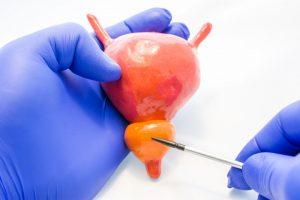A new study led by researchers at UCLA Health Jonsson Comprehensive Cancer Center provides new evidence that a dietary change can help reduce the growth of cancer cells in patients undergoing active surveillance, a treatment approach in which the cancer is monitored regularly without immediate intervention. The findings, published in the Journal of Clinical Oncology, show that a diet low in omega-6 and high in omega-3 fatty acids, combined with fish oil supplements, significantly reduced the growth rate of prostate cancer cells in men with early-stage disease.
Nutrition and Prostate Cancer
This is an important step in understanding how diet may potentially affect prostate cancer outcomes,” said Dr. William Aronson, professor of urology at the David Geffen School of Medicine at UCLA and lead author of the study. Many men are interested in making lifestyle changes, including dietary changes, to manage their cancer and prevent their disease from progressing. These findings suggest that something as simple as dietary modification could potentially slow cancer growth and extend the time before more aggressive measures are needed.
Many men with low-risk prostate cancer choose active surveillance rather than immediate treatment. However, within five years, about 50% of these men will need to undergo therapy with surgery or radiation. For this reason, patients are eager to find ways to delay the need for treatment, including through dietary changes or supplements. However, specific dietary guidelines in this area have yet to be established.
Previous research by researchers at the University of Texas MD Anderson Cancer Center has found that men with localized prostate cancer who followed a diet similar to a Mediterranean diet benefited in terms of their disease. After taking into account factors known to increase the risk of cancer worsening over time, such as age, prostate-specific antigen (PSA) and tumor volume, men who ate more fruits, vegetables, legumes, grains and fish had a lower risk of their prostate cancer growing or progressing to the point that many would consider active treatment.
Omega-3 and Fish Oil Reduce Cancer Cell Proliferation
To determine whether diet or supplements could play a role in the treatment of prostate cancer, the UCLA-led team conducted a prospective clinical trial called CAPFISH-3, involving 100 men with low-risk or favorable intermediate-risk prostate cancer who had opted for active surveillance. Participants were randomly assigned to either maintain their normal diet or follow a low omega-6, high omega-3 diet supplemented with fish oil for one year.
Participants in the intervention arm received one-on-one nutrition counseling from a dietitian, either in person, via telemedicine, or by phone. Patients were educated about making healthier, lower-fat alternatives to foods high in fat and calories (e.g., using olive oil or lemon and vinegar for salad dressings) and reducing their intake of foods higher in omega-6 (e.g., crisps, biscuits, mayonnaise and other fried or processed foods). The goal was to achieve a balanced ratio between the intake of omega-6 and omega-3 fatty acids and to give the participants a sense of control over their behavior. They also received fish oil capsules for additional omega-3 fatty acids. The control group did not receive any dietary advice and did not take fish oil capsules.
Researchers tracked changes in a biomarker called the Ki-67 index, which indicates how quickly cancer cells multiply – an important indicator of cancer progression, metastasis, and survival. At baseline and again after one year, biopsies were taken from the same site, using an image fusion device that helps track and locate cancer sites. The results showed that the group with the omega-6-poor and omega-3-rich diet and fish oil had a 15% decrease in the Ki-67 index, while the control group had a 24% increase.
Long-Term Effects of Dietary Changes
This significant difference suggests, according to the researchers, that the dietary change can slow cancer growth and possibly delay or even prevent the need for more aggressive treatments. While the results are promising, the researchers did not find differences in other cancer growth markers, such as the Gleason score, which is commonly used to track the progression of prostate cancer.
However, the researchers caution that further research is needed to confirm the long-term benefits of omega-3 fatty acids and the reduction of omega-6 fatty acids in the treatment of prostate cancer. The results support further, larger studies to examine the long-term effects of dietary changes on cancer progression, treatment outcomes, and survival rates in men under active surveillance.






